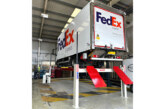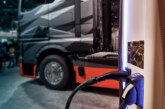LCV market continues to decline

The National Franchised Dealers Association (NFDA) has commented on the latest SMMT’s new van registration figures, which reveal a seventh month consecutive decline for the new light commercial vehicle market.
According to Sue Robinson, Chief Executive of the NFDA, it reflects ongoing pressure on demand amid weak business confidence.
In June, Light Commercial Vehicle (LCV) dealers registered a total of 28,173 new vans and light commercials, reflecting a decrease of -14.8%. This marks the seventh consecutive monthly decline, with demand falling consistently throughout 2025.
New van registrations fell by -14.8% in June to 28,173 units, contributing to a -12.1% decline in the overall LCV market for the first half of 2025, which ended with 156,048 units registered. Demand was particularly weak in the medium and large van segments, with vans between 2.0–2.5 tonnes down -41.5% and those over 2.5-3.5 tonnes – the largest sector in the market, accounting for 64% – falling 10.0%. These larger LCVs are often purchased by fleets, and the decline reflects economic concerns that are currently holding back large fleet orders. In contrast, registrations of vans under 2.0 tonnes rose by 22.0%, while 4x4s rose 16.3%.
Investment in zero-emission light commercial vehicles (LCVs) continues to accelerate, with manufacturers now offering nearly 40 battery electric van (BEV) models. Broader choice is translating into rising uptake, as BEV demand grew by 52.8% in the first half of 2025, reaching 13,512 units. June alone saw a remarkable 97.0% year-on-year increase in BEV registrations. Despite this strong growth, BEVs still account for only 8.6% of the total LCV market year to date, just over half of the 16% market share required under the government’s Zero-Emission Vehicle Mandate.
Sue concluded: “While battery electric van registrations showed impressive growth in June, now accounting for one in every 13 new vans, the market still lags well behind government-mandated targets. Meaningful fiscal incentives for buyers and accelerated rollout of LCV-suitable charge points are urgently needed to boost confidence, support demand, and help the industry transition smoothly towards zero emissions.”









